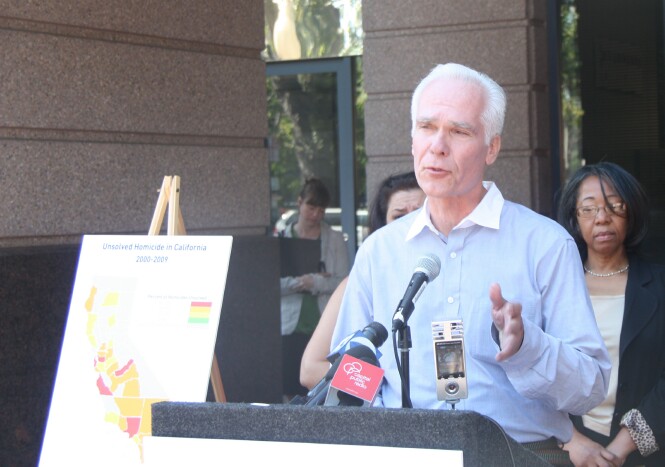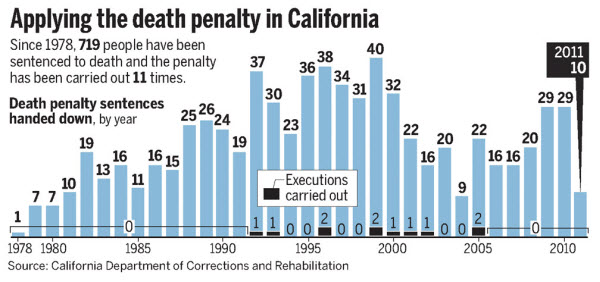 A series of reports have shown that the number of death sentences in California have been declining, with only ten such sentences handed down in 2011.
A series of reports have shown that the number of death sentences in California have been declining, with only ten such sentences handed down in 2011.
A story in the Oakland Tribune tracks the decisions of District Attorney Nancy O’Malley, who has not sought the death penalty in any cases since she took that position back in 2010.
Reports the paper, “In some ways, O’Malley reflects a statewide trend: Statistics suggest there has been a decline in death penalty prosecutions across California, as district attorneys confronting a difficult legal environment shy away from the huge commitment of time and resources that every death penalty case entails.”

This is not the case of the DA opposing the death penalty. Rather, she insists that she “is setting a high bar for pursuing an execution. In her tenure as district attorney, she has confronted more than 30 defendants who were eligible for capital punishment because of the nature of their crimes. Only once did she opt for death, and in that case she reversed the decision just before going to trial.”
“It’s not a lightweight decision to make, we should be pondering this decision and looking at it from all angles,” Ms. O’Malley told the Tribune. “My own personal feeling is that if we make that recommendation, it would be rarely done because we want it to be reserved for the most heinous cases.”
The position of Ms. O’Malley is very interesting. She told the paper that she has a panel of senior attorneys in her office review death penalty-eligible cases and “she has three criteria that must be met to recommend death: Death penalty cases must be a rarity, the crime must be heinous and there must be no doubt about the guilt of the defendant.”
“For myself, it has to be these three criteria and that is playing out here,” she said. “That standard in issuing the ultimate punishment is important.”
Here view is: “Right now, capital punishment is California law and I will continue to follow the law and consider it.”
However, a crime advocacy group takes a different view.
Harriet Salarno chairs the Crime Victims United of California, an advocacy group that supports the death penalty. She told the paper “her group is concerned about district attorneys who won’t seek the death penalty.”
“The law is the law and we as victims have to follow the law, (so) why aren’t they?” Ms. Salarno asked. “We don’t trust life without the possibility of parole.”
Those seem like a couple of odd statements. Following the law, to the DA, is considering the death penalty in death-eligible cases. But at the same time, the law grants the prosecutors discretion as to when to seek the death penalty.
So to suggest that the DA’s are not following the law because they are being more selective seems misplaced.
Meanwhile, it is unclear as to why their group does not trust life without the possibility of parole, or even what that means precisely. Are they suggesting that the punishment is not strong enough or that life without parole is not actually life without parole?
Unlike the local DA, Alameda County’s DA has declined to take a position on the November ballot initiative.
The Tribune reports, “Alameda County is not alone in its reluctance to opt for the death penalty. Statistics provided by some local district attorney’s offices and the state Department of Corrections and Rehabilitation show that the penalty has become less popular throughout the state.”
One of the answers for this reluctance is apparently the fact that the state has only executed 13 people since 1978 and the costs are staggering. They cite a cost for appeals alone in a single death penalty case can exceed $1 million.
“The whole tenor in both the criminal justice system and in the community has changed in regard to the death penalty,” said Laurie Levenson, a professor of law at Loyola Law School in Los Angeles. “Prosecutors realize, in the end, it might not be worth it.”
“Prosecutors are increasingly willing to use the punishment of life without the possibility of parole and recognize that it is more acceptable to the general public,” said Elisabeth Semel, a professor of law at UC Berkeley Law School. “The decreasing popularity of the death penalty … has an influence in the decision.”
Another argument that is cited is the uneven application of the death penalty.
This is borne out in comments by Contra Costa District Attorney Mark Peterson, who told the paper “his office’s decisions on whether to seek death against a defendant take community opinions into account.”
“People here want us to be tough on crime, but they want us to be smart on crime,” he said. “Even though we might personally believe a defendant deserves the death penalty, it doesn’t do us any good to take a hard stance if the community isn’t going to support it.”
The Tribune reports Contra Costa has only one current death penalty case pending and has not had a death penalty verdict in over two years.
“The statistics bear out that the number of death penalty cases has gone down over the years,” Mr. Peterson said. “It’s been almost two years without a death verdict and for the ninth largest county in the state, I think that says a lot.
“For the vast majority of eligible cases,” Mr. Peterson said, “we don’t seek the death penalty.”
For some that may sound like common sense. But for others that means there is an unequal application of the law. A person committing an identical crime in one community might get the death penalty, but life without parole in another community.
For former LA District Attorney Gil Garcetti, this uneven application of the law led to his ultimate shift in position.
“I felt there was an inherent unfairness of the system where I felt that whether an accused person was convicted of the death penalty by a jury could be determined by the local jurisdiction where the case is tried,” he said during an April teleconference.
He added, “We could get different verdicts in the exact same case tried in two different LA County judicial districts – that was real bothersome to me.”
—David M. Greenwald reporting






[quote] Death penalty cases must be a rarity, the crime must be heinous and there must be no doubt about the guilt of the defendant.[/quote]I would think the same standard should be applied for a LWOP prosecution.
Perhaps we should look at another possibility. In Wisconsin, someone murdered innocent people, in their place of worship. He was shot. He perhaps then able to realize what the appropriate action was. He killed himself. Relatively inexpensive to taxpayers…
Perhaps if the Aurora gunman had at least been wounded, he would have done the appropriate thing as well. It is clear that those two individuals committed the crimes.
[quote]The position of Ms. O’Malley is very interesting. She told the paper that she has a panel of senior attorneys in her office review death penalty-eligible cases and “she has three criteria that must be met to recommend death: Death penalty cases must be a rarity, the crime must be heinous and there must be no doubt about the guilt of the defendant.”[/quote]
Pretty reasonable standard – but hpierce is right, the same could be said for LWOP. So what should distinguish a case to be deserving of the death penalty versus LWOP?
In addressing that point, can someone clarify what makes a “heinous murder” different from other deliberate murders ?
Medwoman… how about a person who horrifically slays a 2-year old, in his crib, with a knife, causing blood spatter on three walls and the ceiling, then attacks the mother, 7 months pregnant, killing the fetus, nearly killing her, then runs out to the street, strips himself naked and threatens anyone within earshot? Does that qualify as especially horrific? As opposed to a drug deal gone bad? As opposed to a domestic squabble? Happened in San Mateo, 1976. I made crime scene measurements the next day. I lost track of the outcome of the perpetrator. He may be in the general society today, if he was not “dealt with” by other inmates in prison (even serious murderers draw the line with children and pregnant women). He was ‘high’ on PCP. He ran across Hwy 101 to commit the acts. Heinous? Your response?
It has been 36 years… I will never forget the scene.
BTW… a pint of blood, spread out on the floor, looks horrific. A day later, dried, it makes a ‘crinkling’ sound when stepped on…
To hpierce: Thanks for the very graphic example to make the point. Another example might be the ritual killings committed by Charlie Manson. Serial murderers can be particularly heinous…
ERM… every word I wrote is true, based on what I observed a day later, and I actually toned down what I observed.
hpierce
You have definitely made your point. To anyone with any conscience or moral sensibility, this is indeed more
horrifying than a bloodless killing, such as strangulation or poisoning. I do not doubt that at the time it is occurring it is more horrific to the victims as long as they remain conscious, and it is certainly more horrific to those who have to witness the aftermath. You truly do have my empathy for having witnessed this. I know from personal experience that the trauma of witnessing the outcome of violent, bloody attack leaves permanent marks on the survivors be they family, medical personel, investigators…..
I would however, like to add another point. Using an objective standard, the victim of a murder is just as dead regardless of the modality chosen. As a pacifist, I believe that killing another human being is wrong. For me the goals should be societal safety both from this particular individual and prevention of future such events.
Anything that advances these two goals is where I believe we should be focusing our efforts. I do not believe in “punishment” for its own sake and therefore I believe that deliberate murder should be handled uniformly without people trying to decide which is more “horrifying”. I certainly do not believe in revenge or retribution, not because I have empathy for the individual who is capable of such brutality, but because revenge strengthens our culture of violence as a means of attaining goals ( societal or individual) while doing nothing to support prevention of others from committing the same kinds of attacks.